
Issue 179
June 2019
For Daniel Straus, walking, let alone fighting, is a miracle. The Bellator featherweights has overcome obstacles of Biblical proportions - poverty, prison, paralysis - to somehow fight on.
Fighters feel invincible at best; broken at worst. And in the middle of those extremes, the blended truth is that victory only repairs some things and fleetingly at that. Ask Daniel Straus, still putting his body through the mill for the glory it brings, not to mention the paychecks, the inspiration of his daughter and others close to him and the knowledge that a life can be lived at the extremes, yet not forever.
Straus, former Bellator featherweight champion, tells me fighting is all he knows and how he had to search deep into his soul after being involved in a road traffic accident while riding his motorcycle that threatened his life – and livelihood – just 18 months ago, when he slid his bike under a guardrail on a Florida freeway.
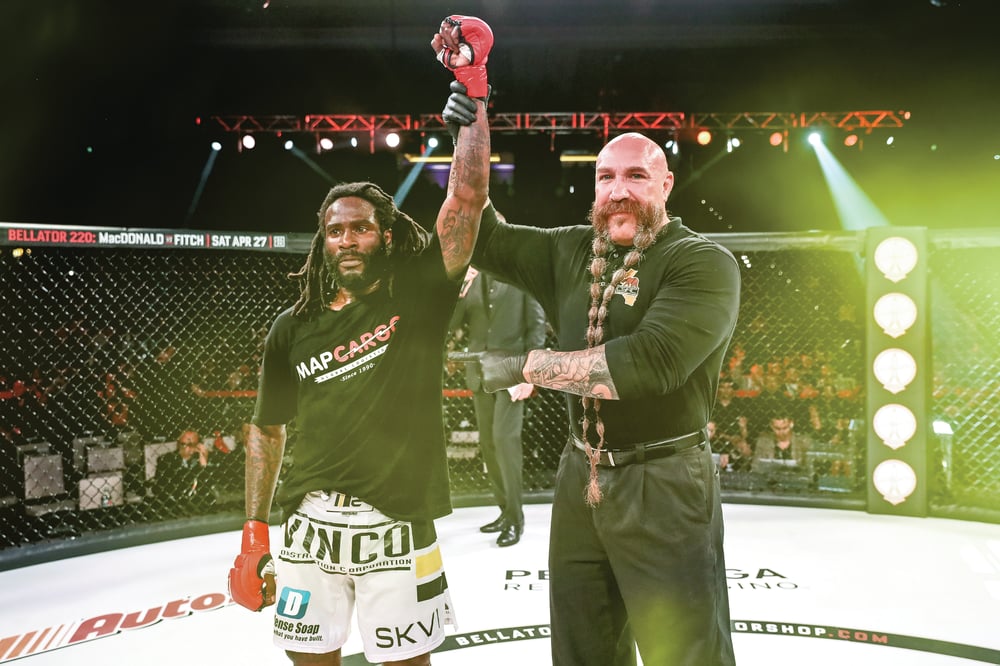
After being told he might never walk, let alone fight again, he bounced back with a power that has captured the imagination of the fight public – and beyond. He is literally a medical miracle. There are days when his neck still pains him, and even days when his legs fight him when he walks...
Yet Straus, always been one of life’s survivors, has come up the hard way in a testing family environment, served three years in prison in a period of darkness in his life – by his own admission when he was “an asshole and screw up” – but lessons learned, has battled his way to becoming an elite MMA fighter and thus, a Bellator belt holder.
Through it all, he has shown an inspiring, enduring soul.
The motorcycle crash was another major test in his life. In the early hours of December 17, 2017, the motorcycle accident left his life in jeopardy. He recalls nothing from the accident itself. Initially paralyzed, then told by doctors that he may not ever walk again, Straus battled back to be able to step back into the fighting arena to resume his career. Through a painstaking rehabilitation process, Straus fought again in March. Willpower, he has proven, is an incredible force.
With his body plugged into machines in the hospital, he had watched the sport moving on through 2018. Without him. “At first, I had no interest in following (MMA) and what the guys were doing,” he explains. “But the further it went on, the more I rehabbed, it was harder to watch life move on past you. Before my last fight, I didn’t realize how long I’d been in Bellator and running at the top of the food chain.” True, that.
Straus grew up rough. He was born in Cincinnati, Ohio, in the suburb of Sycamore Township. It is well-documented that Straus came from a troubled household and by the time he was a junior in high school he was living on his own, while supporting himself, sometimes by underhand means.
Yet Straus’s athleticism kept his, and others’ hopes for him, alive. He was a highly successful, but also controversial, wrestler at Sycamore High School.
His talent was there for all to see, but the wayward freshman in the (112 lbs) weight class became an alternate for the state tournament.
Then, in his sophomore season, he went 2-2 in the state tourney. In his junior season, Straus finished third in the state in Division I, at 135lbs and then, in his senior year, was ruled academically ineligible and missed the second half of the season, meaning he was out of the state tournament.
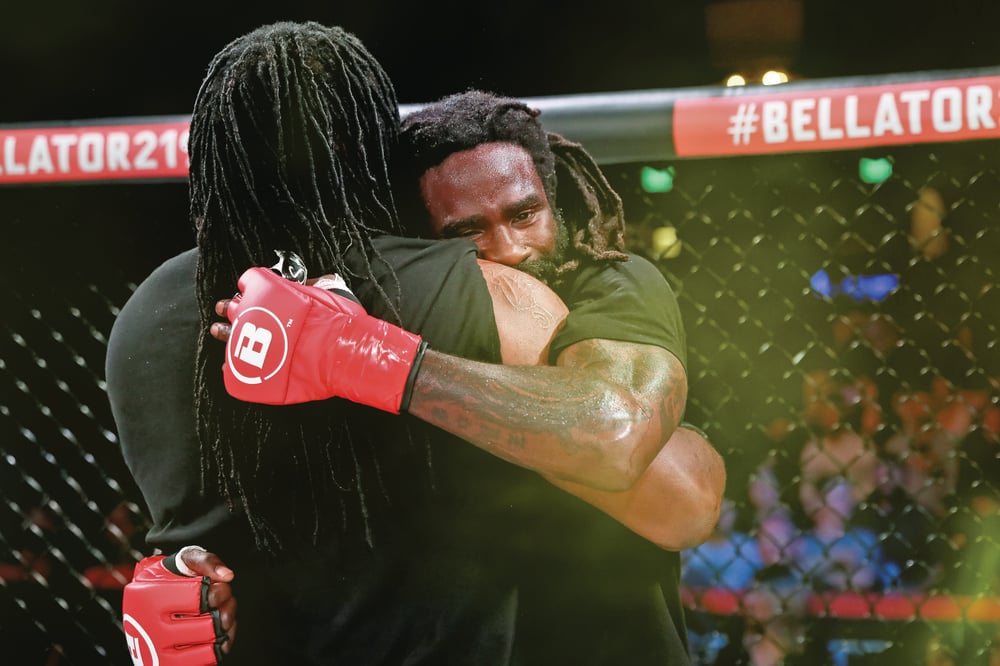
Then came a lifeline: he was given a wild card berth into the NHSCA Senior Nationals – the high school senior national championship – and won the tournament. Straus is considered by many in the Ohio wrestling media to be one of the best wrestlers of the 2001–2010 decade. Some feel he is one of the greatest Ohio high school wrestlers to never win a state title.
After graduating, another dark cloud came over. Straus moved to Florida and worked in a maintenance job, but was arrested on robbery charges and was incarcerated from 2004-2007.
Prison, as we will hear from Straus, was a powerful lesson. Once released, he returned to Cincinnati and became involved in mixed martial arts through a friend who was a former high school wrestling opponent. He invited Straus to come train with him at Team Vision and Straus made his professional debut in February 2009.
That period from high school to early twenties needs his explanation. Why was he seen as ‘controversial’ as a wrestler at high school? “Just because of who I was. I was a very underprivileged child who went to a more privileged school,” he explains. “I was one of the poor black kids who went to a white school. I didn’t have things other kids did. I was homeless in high school, but I was also the school’s best-ever wrestler. I was an outstanding athlete, but I was an athlete that didn’t do well in school and got in trouble. I was a kid who had talent but didn’t have the grades or want the responsibility.”
But he admits the generosity of others assisted him – alongside their belief in his innate abilities.
“That’s where all my coaches came into play. If you watch my career and watch everything that’s gone on in my life, it’s always been my coaches who have guided me to success,” he adds. “The biggest story I could tell you is about my high school wrestling coach. He was the closest thing to me. He always pushed me.
When I went to jail after high school, he reached out to me when I came home. I started fighting, he was there. I went back to jail, and he reached out again. Every time I fight he reaches out to me to let me know he’s still there supporting me. It’s people like that that have made me a great fighter and athlete.”
That man, Andy Price, the coach, has been a continual lifeline. “I wouldn’t say Andy was a ‘father figure’. He was a real role model. It’s not like he tried to be my father. He took me under his wing so he could understand me. He understood I was a goofy kid. He always pushed me for better. He didn’t judge me even though I was an asshole and a screw-up. He always pushed me to be better and expected me to be better. When I didn’t do better, he let me know. He wasn’t happy with what I was doing and he expected more. I’ve always tried to be better when he was around.”
So how troubled was his home life? Arguably, Straus plays it down. “It’s hard for me to put [my upbringing] into words because as hard as it was for me, everybody has their own life story. Everybody has their own family problems and ups and downs. I may think my life was hard, but maybe it wasn’t that hard. The situations I went through weren’t common, but I’m not going to say they were detrimental. I grew up in complete poverty. I grew up in filth, a single-parent home, drug addicts, alcohol addiction . . . it was rough for me. But it was what it was.”
“We didn’t have Christmases or birthdays. We didn’t have money for that. But that doesn’t mean we didn’t have nothing. We shared clothes. I have a twin sister and an older brother. My mum worked a couple jobs. I jumped from house to house. That’s just what it was. It was a rough lifestyle. It was basic life issues. I got past it. I’m working to better my life and I have a better life with my daughter. That’s all there is to it.”
But that life he endured was also the making of a man. The man he is today.
As he strutted to the fighting arena at the Pechanga resort in late March in the co-main event, another great story enhanced his fight. The narrative was there in many headlines:
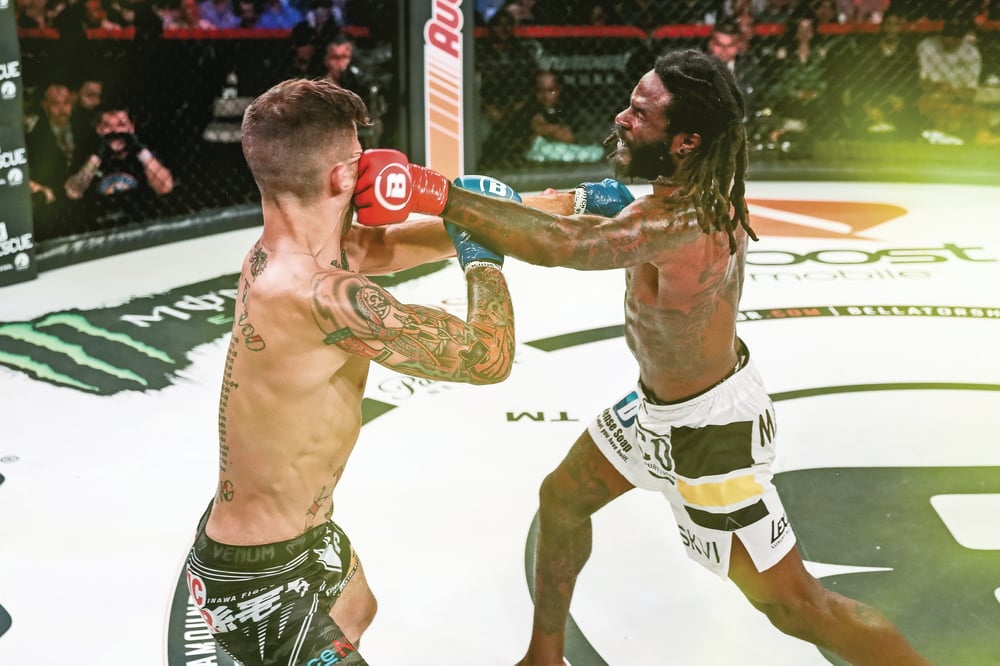
Straus (24-8, 1 NC) was facing U.S. Marine Corps veteran Shane Kruchten (12-4), who had his own harrowing yet enlightening tale, involving PTSD, alcoholism, attempted suicide and utter redemption.'
But it was Straus who took victory in Temecula in the opening round. A triumphant return after another harrowing chapter of his life. “It’s a fucking crazy story,” he interjects.
“But, you’ve got to put your best foot forward and do what you’ve got to do. Every time I get on the bike now I say a quick prayer to protect me. I go about my business.”
Those of us who ride bikes all know that mantra.
“Within an hour of the accident happening, I was discussing what I’d be doing in the future. Most people at that point wouldn’t care. But that is my life – fighting. It’s the connection to everything – my family, my daughter, my friends. My connection is fighting. It’s my career, it’s what I do and it’s who I am. As soon as I got to the hospital it was about the next step. They said you may or may not fight again. I said: “I don’t know what the fuck you’re talking about but I have to get back to fighting.” From there, it was all focus on getting back.'
There must have been hard days, in the shadows when his thoughts grew to monsters.
“There were plenty of dark days. There’s going to be better days but I was still fighting. You don’t just heal, you don’t just get better, there’s a lot of days where I didn’t think I’d fight again or even train again. There was a lot of down days. But those days made me who I am. I’ve got to go with what I got and push forward. I either wanted it or I didn’t. In my eyes I just wanted it enough to get it done.”
Even now, peculiarly, there are days when his body does not want him to walk. He even had days like that in the build-up to the fight with Kruchten in Temecula. “You don’t just fully recover from something like that, that’s everyone’s misconception. I’m not fully recovered at all. I’m recovered enough to fight. Time will go on and there’s a lot of deficits that I’m still trying to work past and strengthen. That’s what makes it me. There’s no secret on how to beat me, but you’ll have to get in the cage to do it. Meanwhile, I’m working to be a better person, a stronger person and build on the deficits I have. For me, in my book, I can only get better and stronger. I’ve never really got to fight at my full potential. At my prime, I won the belt and broke my hand. I have a lot to sell. I can be behind the eight ball and continue to grow.”
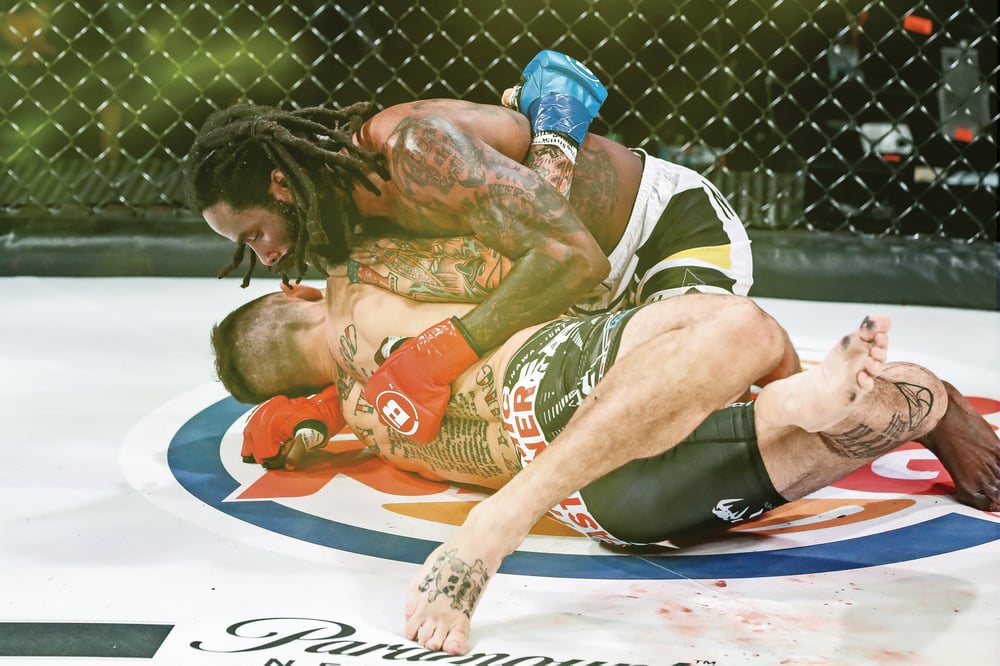
Featherweight is where he will return, where he won the Bellator title, the division where the fight league’s president Scott Coker has said that there will be a tournament starting in the fall, on broadcast platform DAZN, who will no doubt want to use the narrative of Straus’s life as one of the selling points of a 16-man struggle for the belt.
Patricky Pitbull, James Gallagher, AJ McKee, and others. It really could turn out to be a ripper with some amazing match-ups, the quarter-finalists set to be decided in one night of fights, at one event. It is a mouth-watering prospect.
“Yes. Everyone knows me as a featherweight, that’s my home, my stomping ground. I want to be a part of that tournament. That’s where I made my name with this company. That’s where people know me from. What better way to end the year by being in that tournament and winning.”
There are other factors, too, which we cannot ignore. Like the will to push on for his daughter, and indeed, for her faith in him. Mikayla, is her name, and Straus spells it out for me. M-I-K-A-Y-L-A.“My daughter’s dope. She’s six going on 26. She has a great mother, I’ve known her since high school. We have a great relationship and a great child. My child is just like me. Her being her, pushes me. She’s a big fan of what I do. It’s really a big thing for me to have my little girl excited for what I do. To be somebody’s hero.
There’s a lot of people who hit up my inboxes and tell me they look up to me. And that does feel good, but it’s another thing to have your own child really, really look up to you and care about the thing I do. Bragging to her friends, her teachers, her cousins and aunts, and grandparents. It’s really motivational. She loves it and I love it. That’s why I do it.”
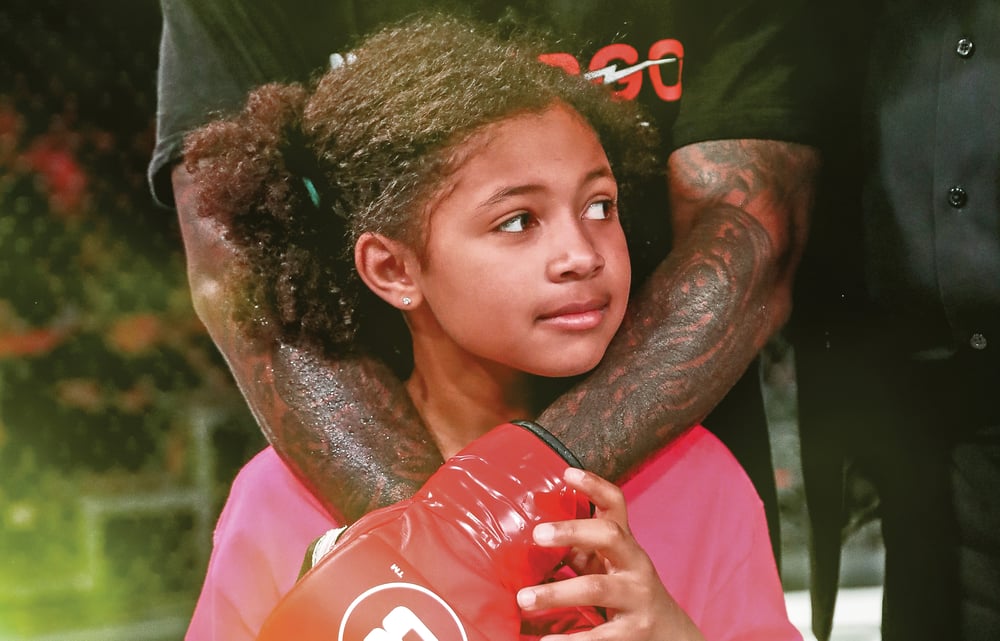
Straus is not with Makayla’s mother, but they are close, parenting together. “We’ve been best friends since high school. It was one of those things. We ran into each other after not seeing each other for years. One thing led to another, she got pregnant. We’re good with each other. We do what works for us. We’ve always been cool and she’s had a good influence on my life. There’s definitely been some good parts to my life.”
So we speak about jail. It must have been tough, but it also taught him so much. “I knew a little about MMA when I went to jail. When I came home from jail I didn’t want to do any fighting. I had done enough fighting. I had fought many times in the three years I was locked up. I didn’t want anything to do with fighting. I didn’t know anything about jiu-jitsu or anything. When it was first introduced to me I wasn’t too hot on it. But through the circumstances, I just went for it.”
So Straus is a strong character, he can wrestle, he is very tough, and he does not back down. Jail must have brought many things to a head. “It’s prison, it’s dangerous anywhere. I didn’t have any stabbings that happened to me, but there was stabbings around me. I wasn’t trying to be a badass, I was trying to survive and get home. Like everyone in there was. But sometimes you just have to fight, whether you want to or not. That’s just how it is. I wasn’t looking for trouble or be a bully, it was part of life in there.”
He adds: “The thing that helped me was when I was in jail I never talked about growing up so no one knew I could wrestle. But once people figured out I wasn’t a pushover, it was much different. They weren’t beating up a little dude, but fighting someone who could handle themselves.”
So what did he learn, really learn in there. That he thinks about today, twelve years on...
“The thing I learned from prison was it sucks and it wasn’t a place for me. It’s not a place for me. I don’t care how bad or cool you want to look to other people, it’s not a place for me. I’m not trying to go back there or be that guy who has done four different numbers or been down 15 years. I don’t care, I don’t give a fuck, I’m not going back.
Being inside I really didn’t want to be around anybody or have anyone around me. I didn’t like big crowds and I still don’t. I don’t want people in my space. These are things I brought home.”
But the biggest thing was “patience”.
“And I’m still not 100 percent patient, but when I first got locked up, the first thing I learned was I cannot leave here, no matter what I do. I can’t fucking leave so I got to sit down and be patient until my time was up. I took it day by day and that’s all I could do,” he recalls.
“I’ve taken that with me throughout everything,” he continues. “When I broke my hand, I was so ready to get back in the cage. I had to have three surgeries because I was back in the gym with one boxing glove on. It was better to sit my ass down and be patient. With this injury, I know it’s not going to come tomorrow, next week or next month. I’ve been building block by block and wait until my time. And I’m here.”
And just how did it feel on that night in Temecula, late in March, beating his own body to get back into the cage and claim victory once more?
“It was good. It’s hard to describe. But it was good to walk away with my hand raised. It wasn’t to get back in the win column, but to get back on the right road. It’s been good.”
Another lesson. Another step in the right direction. Another rung in the remarkable life of Straus – father, fighter, champion, survivor...and role model.
...









